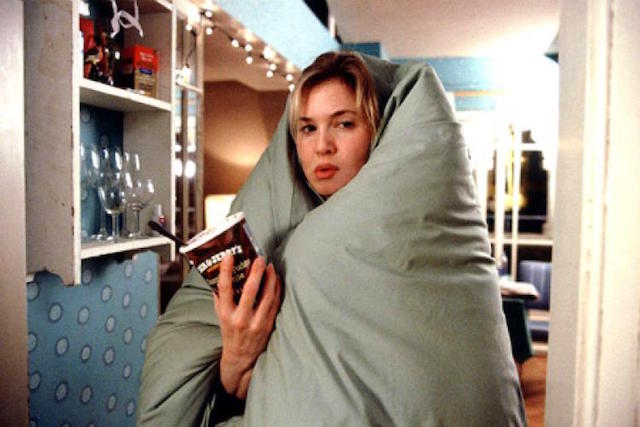
For a long time, I struggled with nighttime eating.
I would find myself sitting on the couch with my husband, watching TV, mindlessly eating a bowl of ice cream, a bunch of cookies, or a bag of chipsâafter having had a satisfying dinner.
I knew this wasnât a healthy practice, but no matter how many times I promised myself “not again,” I just couldnât stop. It was so frustrating and disheartening to feel out of control in this way, especially when I was in control in so many other areas of my life.
In my search for a solution, I learned about Mind-Body Nutrition. Following its principles, I was able to make some changes that allowed me to say goodbye to mindless nighttime eatingâfor good.
I also learned that this struggle is all too common. That’s why I want to share the strategies that helped me, so that you too can tame the nighttime eating beast!
1. Bulk up your breakfast.
If you’re skipping breakfast or starting your day by grabbing a cup of coffee and something light, it’s actually predictable that you would struggle with nighttime eating. Why? Youâre creating a nutritional deficit. By the end of the day, your body will try to make up for it by amping up your hunger.
Try bulking up your breakfast by adding high-quality protein and healthy fat. Aim for about 20 grams of protein and 10 grams of fat.
Here are some options:
>> High-quality protein shake with avocado, nut butter, or coconut oil
>> Eggs and vegetables sautéed in coconut oil, ghee, or olive oil
>> Full fat, organic Greek yogurt with berries, cinnamon, and nuts
>> Oatmeal mixed with protein powder and nut butter, nuts, or coconut oil
If you have been caught in a nighttime eating cycle, you may find youâre still feeling full when you wake up in the morning. To break the cycle, you may need to force yourself to eat even if you arenât hungry. Gradually bulk up your breakfast by increasing protein first, then fat, and watch your nighttime eating diminish.
2. Slow down.
By slowing down when you eat, your body will be able to better digest your meal and absorb more nutrients. As a result, you will be less likely to experience the nutrient deficiency-triggered drive to eat at the end of the day.
What does slowing down look like? For me, it’s chewing my food thoroughly to the point of mush before swallowing, putting my utensil down between bites and not picking it up again until I’ve swallowed, and pausing to breathe.
3. Pay attention.
Many of us donât just eat. Instead, we treat eating as if it were an inconvenience that gets in the way of us getting other things done. I admit that I still fall into this trap sometimes. But by multi-tasking while eating, weâre actually doing ourselves a great disservice.
Research estimates that 30 to 40 percent of our digestive capacity comes from paying attention [1]. By multi-tasking, we are reducing our digestive power and diminishing nutrient absorption. The result? We need to eat more food to get the nutrients our body needs.
Further, our hunger later on is highly influenced by our perception and experience of what we ate. In other words, the extent to which we pay attention to and from a memory of our eating experiences during the day will influence our hunger at night.
If you are a meal multi-tasker, try an experiment. For a week, give yourself the gift of time, and be a full participant in your eating experiences.
4. Let go of good and bad and explore the gray.
Do you tend to evaluate your choices in terms of good and bad? Do you strive to be “good” or eat “clean,” only to lose it at night? That black and white, good or bad thinking creates feelings of deprivation and unattainable perfectionism that encourages your little inner rebel to come out to balance the score.
Instead of judging yourself in black and white terms, try practicing gentle compassion. Check in and get curious about how you are feeling and how you would like to feel. Begin to notice and explore how your food choices affect your energy, vibrancy, and mood. Shift your thoughts to, What will make me feel (insert however it is youâd like to feel)?
Youâll begin to loosen those threads of judgment and perfection, and your inner rebel will have less need to come out nightly.
5. Ask, “What am I really needing?”
Speaking of exploring how you’d like to feel, when the urge to eat mindlessly at night comes along, pause and ask, âWhat am I really needing in this moment?” If you could wave a magic wand, what would you give yourself? And what need would that satisfy? The answer may not come right away, but by asking the question, you open the door of curiosity and allow for a response to surface in time. Once you know what you are really needing, you can create a menu of options to satisfy that needâthat may or may not even involve food.
Nighttime eating is a sign that something is out of balance, physically or psychologically. These strategies will help you rebalance in both mind and body.
~
References:
[1] David, Marc, 2005, “The Slow Down Diet: Eating for Pleasure, Energy, and Weight Loss.” Rochester, VT: Healing Arts Press.
~
Relephant:
My Favorite Vegan Breakfast Bowl Recipe.
How I Transformed My Body & Life with Mindful Eating.
~
~~
Author: Dawn MacLaughlin
Image: IMDB
Editor: Callie Rushton
Copy Editor: Travis May
Social Editor: Catherine Monkman


 Share on bsky
Share on bsky




Read 29 comments and reply